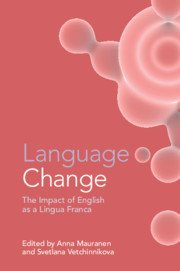
-
Select format
-
- Publisher:
- Cambridge University Press
- Publication date:
- 17 December 2020
- 03 December 2020
- ISBN:
- 9781108675000
- 9781108492850
- 9781108729819
- Dimensions:
- (228 x 152 mm)
- Weight & Pages:
- 0.68kg, 384 Pages
- Dimensions:
- (228 x 152 mm)
- Weight & Pages:
- 0.7kg, 384 Pages
You may already have access via personal or institutional login
Book description
English as a lingua franca (ELF) has become ubiquitous in today's globalised, mobile and fast-changing world. It is clear that it will have an unprecedented impact not only on how we communicate but also on our understanding of language use and change. What exactly ELF brings to our life and to language theory is a question which requires an interdisciplinary take. This book gathers together leading scholars from world Englishes, typology, language history, cognitive linguistics, translation studies, multilingualism, sociolinguistics and ELF research itself to seek state-of-the-art answers. Chapters present original insights on language change, based on theoretical approaches and empirical studies, and provide clear examples of social, interactional and cognitive changes that ELF instigates. The picture which unfolds on the pages of this book is complex, dynamic and makes a convincing case for the importance of English as a lingua franca on language change at a global scale.
Reviews
‘What can studies of English as a lingua franca (ELF) contribute to world Englishes research, sociolinguistics, historical linguistics and language evolution? This collection – comprising both theoretical position papers and empirical case studies – marks an impressive starting point for the necessary dialogue across sub-disciplines.'
Christian Mair - University of Freiburg
Contents
Metrics
Altmetric attention score
Full text views
Full text views help Loading metrics...
Loading metrics...
* Views captured on Cambridge Core between #date#. This data will be updated every 24 hours.
Usage data cannot currently be displayed.
Accessibility standard: Unknown
Why this information is here
This section outlines the accessibility features of this content - including support for screen readers, full keyboard navigation and high-contrast display options. This may not be relevant for you.
Accessibility Information
Accessibility compliance for the PDF of this book is currently unknown and may be updated in the future.


